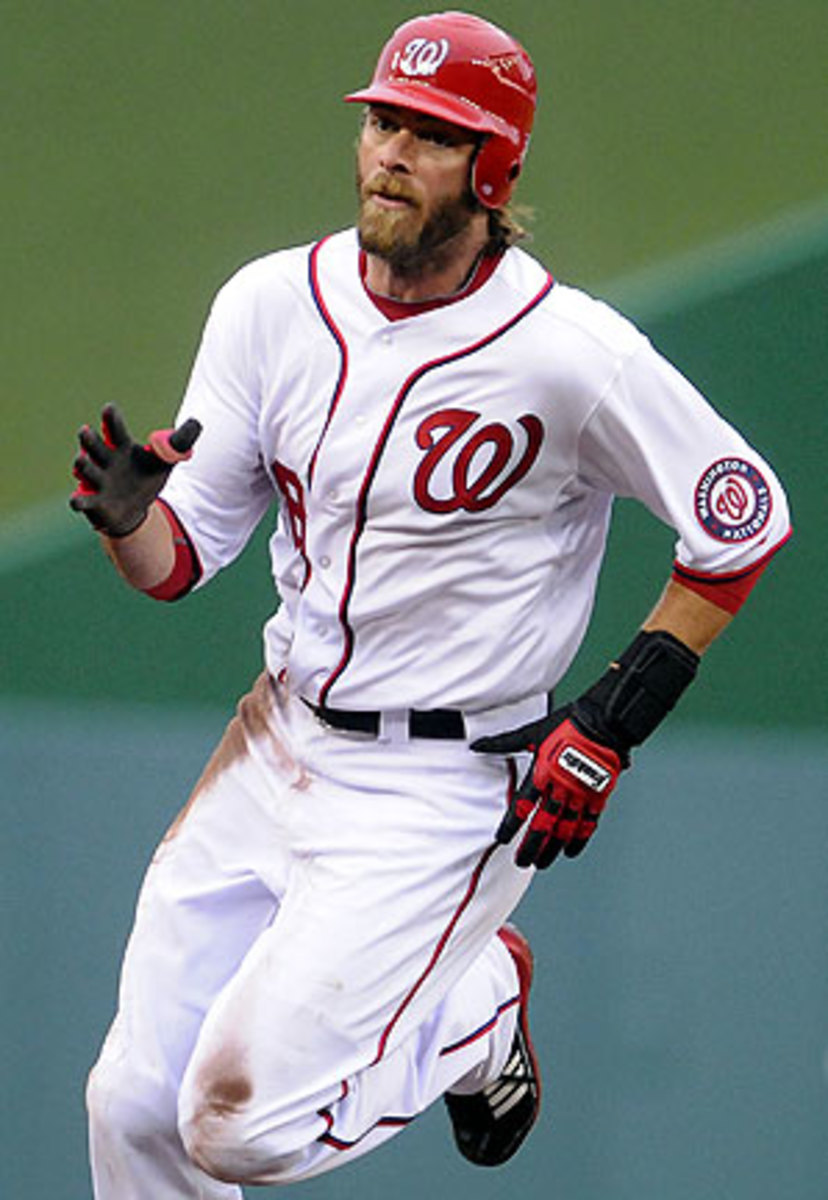
Opening Day impressions: Nats understand Werth's value
The Washington Nationals gave Jayson Werth $126 million to bat . . . second? Why pay a guy middle-of-the-order money and not hit him in the middle of the order? It's actually a smart move by manager Jim Riggleman and the Nats.
Werth never has been the focal part of a lineup and doesn't have the personality for that kind of spotlight. He hit .186 with runners in scoring position last year and is a .260 hitter in those run-producing spots -- worse than his overall average of .272.
The Nationals clearly overpaid to get Werth, but that doesn't mean they're obligated to hit him third or fourth when he's not that kind of a hitter. So give Washington credit for knowing his limitations, regardless of how well it pays him. Werth never was intended to be that kind of franchise hitter, anyway, but will look better in the Washington lineup when the Nats do add one or two such bats (an elite free agent such as Prince Fielder or Albert Pujols and uber-prospect Bryce Harper).
Meanwhile, if Opening Day is an indication, the Nationals could be looking at a slow start. Against Atlanta righthander Derek Lowe, four of Washington's first five hitters (and five of the eight position players overall) were righthanded, and the Nats came up with nothing in a 2-0 loss. The Nats figure to open against six straight righthanded starters and eight in their first nine games -- and then they get the Philadelphia rotation.
That schedule puts tremendous pressure on Adam LaRoche, who represents their only true lefthanded power threat. And LaRoche is a notoriously awful starter (.211 career in April).
Bryce Harper . . . please pick up the white courtesy phone.
Atlanta manager Fredi Gonzalez moved Jason Heyward from the second slot to sixth -- which will cost Heyward about 72 fewer plate appearances this year, all to get Nate McLouth to the plate more. Hmm. The move looked good for one day, anyway, when Heyward hit his second Opening Day homer in as many big league seasons.
The Phillies already knew the Braves were a legit contender. (You can make a case that San Francisco never gets out of the first round last year if Martin Prado is healthy for Atlanta.) But that Opening Day win showed the Braves at their best look as good as anybody in the league.
Lowe showed his September run was no fluke. At 37, and thanks to the slider he embraced late last season, Lowe has become a strikeout pitcher -- a most unusual late-career metamorphosis. After averaging 5.9 strikeouts per nine innings last season entering September, Lowe is averaging 8.7 SO/9 and is 6-0 with a 0.99 ERA in his past six starts. In other words, he is ace in every sense of the word but velocity.
Moreover, Prado looks comfortable in leftfield, Chipper Jones looks healthy and that Braves bullpen (Peter Moylan, Johnny Venters, Craig Kimbrel) has flat-out filthy stuff. Gonzalez made a big commitment to Kimbrel by giving him the ninth inning behind Venters even though two of the first three hitters were lefthanded. Kimbrel buzzed through a perfect inning with two punchouts. That reinforced Gonzalez's notion that Kimbrel can be the primary closer whether the hitters due up are lefthanded or righthanded.
Clayton Kershaw of the Dodgers looked almost unhittable against the Giants, particularly with the downward bite on his breaking ball. With nine punchouts, Kershaw tied the Los Angeles Dodgers record for strikeouts by a lefty on Opening Day (Fernando Valenzuela, 1986). Only one Los Angeles pitcher ever fanned more than Kershaw in the first game of the season: Don Drysdale had 14 in 1960 -- while throwing 164 pitches in an 11-inning complete game. And keep this in mind as you wait for Stephen Strasburg to be The Next Big Thing: Kershaw, 23, is only four months older than Strasburg -- and already has 506 career strikeouts.
• Most impressive display of the day? Ryan Braun of Milwaukee hit a 440-foot homer in the fifth in Cincinnati, then in his next at-bat busted out of the box on a routine single to left, allowing him to hustle into second when leftfielder Johnny Gomes bobbled the ball. Braun's hustle created a run. Now that's a ballplayer.
• Did you see the Dodgers snap a 0-0 tie in the sixth when Giants catcher Buster Posey airmailed a throw to third on a ball he blocked in the dirt? Watch home plate umpire Gary Cederstrom on the replay. He raises his left hand to call time and is reaching into his pocket with his right for another baseball -- before Posey throws to third. Now that's taking pace-of-game edicts too far. The Giants did not argue the play should have been dead.
• That left side of the San Francisco infield (Miguel Tejada and Pablo Sandoval) needed only one game to prove it looks like a disaster.
• Meanwhile, the San Diego middle infield of Jason Bartlett and Orlando Hudson will be fun to watch. They turned four double plays yesterday.
• Nice to see the Tigers gave $16.5 million to a guy who apparently can't get six outs. Joaquin Benoit got six outs only once last year for Tampa Bay. Detroit overreached for him via free agency, then threw away a seventh-inning tie at Yankee Stadium by giving the game to Phil Coke, who does not profile as a legit left-on-left pitcher, instead of their huge relief investment. Eight of Coke's 13 career homers allowed have been hit by lefties, including the game-breaker by Curtis Granderson yesterday. Apparently for $5.5 million per year Benoit (.144 vs. lefties last year) doesn't do seventh innings. That's not a knock on manager Jim Leyland. It's a knock on how over-specialized the game has become.





